
Sundin, Buelens and Stradi were unanimous in their support of the liberalisation of traffic rights across Europe and the positive impact this can have at regional airports.
SMAG membership has grown exponentially since it was launched almost three years ago; Small and Regional airports have a vital role as engines of economic development in their regions. Sundin’s appointment as Chairman of the Group will formally take place at the Conference in Linz and he believes the time is now right to take SMAG into the next stage. “It is clear that there is no one-size-fits-all solution to the challenges facing airports. Smaller regional airports have a different agenda to the larger hubs and they need to make their views heard,” he said.

Sundin: “It is clear that there is no one-size-fits-all solution to the challenges facing airports. Smaller regional airports have a different agenda to the larger hubs and they need to make their views heard.”
Buelens explained that Charleroi has come back into the ACI EUROPE fold to participate in the work it is doing on behalf of Small and Regional airports. “The airport industry has been too divided and if we want to effectively face the challenges ahead, we need to keep a single voice to get more leverage and further reinforce our influence. While in the past the larger airports were defining the agenda, smaller airports are becoming more and more important and need to be more involved in policy issues and in defending the interest of our sector.” he said.
Sundin, Buelens and Stradi were unanimous in their support of the liberalisation of traffic rights beyond the EU and the positive impact this can have at regional airports. Indeed, Charleroi now has seven destinations to Morocco due to the EU/Morocco open skies agreement.
The economic situation
While oil prices are no longer having the devastating effect they were last year, the current global economic crisis is having a profound impact on the industry. Stradi explained that in Italy the economic crisis has been further worsened by the Alitalia/Air One issue – the merger of the two airlines has resulted in a significant decrease in the number of flights operated at many airports. “A significant and more than proportional drop in passenger traffic has then followed due to the general lack of confidence among the travelling public, determined by a long period of strikes and inefficiency at the national carrier. These factors have particularly affected some Italian regional airports where the presence of the two airlines, now merged in Alitalia/CAI, was stronger. It is, therefore, very difficult to be able to determine an objective market trend leaving out of consideration the consequences of the merger of the two leading players in our market,” said Stradi.
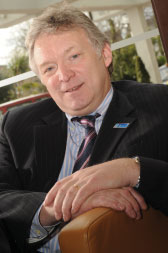
Buelens: “If you keep your costs under control while spending budget on essential elements that are sure to deliver positive results, economic uncertainty will not have an enormous impact.”
In LFV’s case, the economic situation has simply meant fewer passengers, but the numbers speak for themselves. In January, passenger traffic on domestic services fell 22% (0.8 million passengers). Passenger traffic on international routes was down 11% to 1.1 million, meaning a total reduction of 16% compared with the same month last year.
The contrast at Charleroi is acute – Buelens believes that the economic crisis has had a stimulating effect on low-cost travel, as travellers are choosing to spend less money on their flights and favour Low Cost airlines. Passenger numbers at the airport increased 20% in 2008 to almost three million – a success driven largely by new route launches from Wizz Air and Ryanair, as well as the arrival of Jetairfly. Buelens expects a similar growth rate for the first three months of 2009. An additional dimension to this growth is the strategic partnership Charleroi has entered with SAVE – Venice airport. “SAVE is coming into our company to finance and develop. It brings a lot of know how in terms of food and beverage offering and will help optimise our commercial activity. SAVE is a partner that thinks strategically in the same way as we do,” said Buelens.
While the economic situation is having a huge impact on airports in Sweden, Sundin sees advantages in a downturn for those airports that are in control of the situation. He used an interesting analogy: “It’s like everybody is sitting in a sauna – those that are prepared for the heat will survive and get stronger, those that are not will go wither away. There will be a new structure and some positive things will come out of the downturn.”
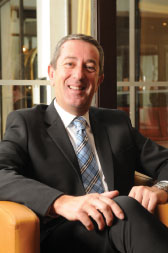
Stradi: “Cooperation between airports and their reference territory is getting stronger and stronger considering that new flights can effectively foster economic growth in airport areas.”
State aid
The Ryanair/Charleroi case has thrust the issue of state aid into the spotlight (see article on Page 19). The recent annulment of the European Commission ruling by the Court of First Instance has potentially positive consequences for other Small and Regional airports. “As long as all parties – the airport, its shareholders and the airline – are happy with the agreement and the results, the outcome can only be considered as being positive,” said Buelens.
Sundin referred to the fact that the Ryanair/Charleroi case greatly influenced the European Commission’s thinking in formulating the state aid guidelines in 2005. “Some would say too much. With all the 10-12 conditions laid down in the guidelines, the Commission imposes very cumbersome restrictions on any airport that wishes to implement a start-up aid scheme while adhering to the guidelines.” He added “This is demonstrated by the very few formal notifications to the Commission pursuant to the guidelines. On the other hand, we see a number of formal proceedings of investigations of start-up aid in the form of discounts on airport charges and marketing support of alleged illegal nature at other airports. We suspect that the failure of the guidelines to create a clear framework with regard to the use of the private investor principle further contributes to a great uncertainty of what a public airport may or may not do, ultimately putting it at a disadvantage. We would welcome a thorough revision of the guidelines in 2009 that also takes into account the present economic realities in aviation, the financial crises and the changing attitude to public support of ailing industries.”
It is essential that the importance of airports as engines of economic development is recognised – throughout Europe, airports are playing a vital role in defining their region’s economy. These social and economic benefits that airports can bring must be preserved. “Cooperation between airports and their reference territory is getting stronger and stronger considering that new flights can effectively foster economic growth in airport areas,” said Stradi. “Up to a few years ago there were few regions participating actively in the start-up phase of new flights; now the situation is completely different and the decision of the European Court of First Instance takes this new market-driven approach into due consideration, thus recognising for the Walloon Region the possibility of complying with the private investor criteria, acting as it did within the scope of economic business enterprise.”
Stradi did, however, contend that EU directives on state aid make no distinction among different airport categories, imposing the same standards to airports of all sizes. This may be a disadvantage to small airports, which with smaller catchment areas are more likely to need support during the start-up phase of some services. “The notification procedures may be very demanding for small airports because they imply a strong commitment by the airport organisation as well as the assistance of advisors with consequent costs and lengthy procedures to get Commission approval,” said Stradi. “It is also to be said that in Italy as in many other countries, there are still conflicts of competence between airport authorities and other institutional bodies.”
Airport competition has evolved so much in Europe that airlines can pick and choose their routes, with minimal, if any long-term commitments. Against this backdrop, Buelens believes that in some areas of Europe funding a route with public aid can be considered as a necessity, although Brussels South Charleroi never funds a route entirely by public aid.

LFV’s market-stimulating programme is based on the premise that airlines look for new destinations, not for airports and focuses on cooperation with the tourism industry at both local and national level.
Market stimulation
The LFV regional airports’ model is impressively proactive and innovative in terms of its cooperation with the tourism industry. Its market-stimulating programme is based on the premise that airlines look for new destinations, not for airports and focuses on cooperation with the tourism industry at both local and national level. “To get the necessary drive in these projects we have chosen to work with a few top destinations that have the potential to attract substantial volumes of foreign visitors. Together with our partners in these projects we invest in marketing activities. The purpose is to convince tour operators/hotels to share with us and the risk of opening routes to our regional airports. We have already seen some encouraging results and hope to see more success in the future,” said Sundin.
LFV offers discounts on airport charges as part of its incentive programme for new routes – this covers two years for seasonal routes and five years for scheduled routes.
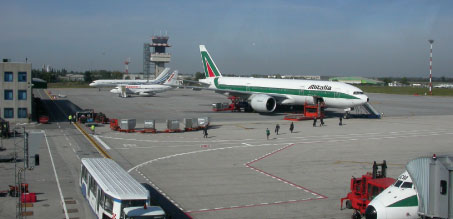
Stradi explained that measures aimed at noise reduction and its impact on the neighbouring area through revised landing and take off procedures can be particularly cost-effective. Trieste International Airport recently revised these procedures without any additional cost to its airlines.
Airport Charges Directive
The Council of Ministers completed final adoption of the EU Directive on Airport Charges on 19 February and it will enter into force in Member States by early 2011 at the latest (see article on Page 15). ACI EUROPE was successful in its lobbying on the scope of the Directive – the threshold has been increased from one million to five million passengers per year, which is considered a workable compromise. Stradi explained “The new directive has seen the strong commitment of ACI EUROPE in favour of simplified procedures and requirements, though in a market-oriented view, and no doubt it simplifies the administrative activity of airport operators with less than five million passengers. In Italy airport charges have been blocked since 2000 and no airport operator has managed so far to get a revision of existing charges levels from the national regulator for a number of reasons, including extremely complex administrative procedures.”
While all of LFV’s Small and Regional airports fall outside the scope of the Directive, it nevertheless adheres to the core principles of non-discrimination, transparency and consultation with users. “We believe the scope of the Directive is a balanced compromise for regulation at European level,” said Sundin.
A general fear however, is that the Directive will not be uniformly implemented by Member States. Buelens added that “the Directive does not fully meet the airports needs since it only provides the airport with the right to charge, but does not give any mechanism to enforce them.”
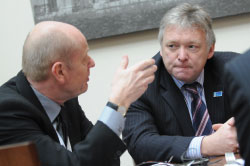
When asked about the priorities moving forward, Sundin emphasised the transition to action on operational benchmarking between members, development of best practice guidelines and investigation into possible synergies in procurement.
Low airport charges can have a potentially enormous impact on commercial revenues; this can be both a positive and a negative impact according to Buelens. “If an airport does not have sufficient means of creating commercial revenue from other sources than airport charges, the result is most likely to be catastrophic,” he said. “In the case of Charleroi, stimulating our passengers to spend sufficient money in and around the airport has produced quite interesting results. Brussels South Charleroi Airport increased its profitability again during the last year through its commercial activities.”
Stradi explained that excessively low charges would make the operator of a small regional airport increasingly dependent on public funding and that a balance between low charges and non-aeronautical revenue streams is preferable. “Low charges foster airlines to start new flights thus generating an overall increase in both aeronautical and non-aeronautical revenues,” he said.
Achieving sustainable profitability under increasing regulatory conditions and costs, environmental pressure and economic uncertainty, is a contemporaneous issue for airports. According to Buelens, cost control is key: “If you keep your costs under control while spending budget on essential elements that are sure to deliver positive results, economic uncertainty will not have an enormous impact.”
Ryanair’s one-bag rule
Non-aeronautical revenues are essential to the sustainable profitability of regional airports and Ryanair’s announcement in January regarding strict implementation of its one cabin bag rule has serious consequences for airport retail, which accounts for a substantial proportion of revenues. This is notably the case at Charleroi, where Ryanair is the dominant carrier. “Non-aeronautical revenues are critical to Small and Regional airports,” said Buelens. “Ryanair’s one cabin bag rule is a major concern and yet another challenge for us to re-think our sources of income.” He referred to the possibility of introducing a ‘Pick and Fly’ offer if Ryanair persists with the one-bag rule. The danger, of course, is that the rule may be copied by other airlines. There is, as yet, no evidence that this will happen and Stradi called for airport operators to stand together to oppose the rule. This, he believes, may lead Ryanair to reconsider its decision or apply the rule less strictly. “Otherwise, as already happened for transport limitations for liquids in carry-on bags, we will have to work out alternative solutions in order to reduce passenger discomfort and inconvenience and the consequent economic loss for airport operators. As a matter of fact it is already possible to buy things at some airports and have them delivered home,” said Stradi.
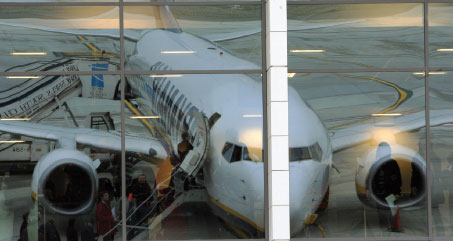
Ryanair’s announcement in January regarding strict implementation of its one cabin bag rule has serious consequences for airport retail. The danger is that the rule may be copied by other airlines.
Security funding
Constantly changing threats and regulations make funding security a challenge, particularly for Small and Regional airports, which Stradi explained have “higher fixed costs and no economies of scale, thus resulting in higher costs per passenger”. Technology advances therefore have an important role to play in reducing costs. Buelens said: “On top of the ever-increasing cost and efforts we all want to keep travelling as pleasant as possible – this is a significant challenge. We do not exclude that we will have to install a security fee to partly cover the ever-increasing security investments.”
Environmental strategy
Charleroi is committed to ensuring that its infrastructure has a minimal effect on the environment. Its terminal is light sensitive and saves energy whenever possible, the airport has its own water cleaning station and all staff are obliged to follow the environmental guidelines of the company. Buelens also advocates participation in ‘eco activities’; Charleroi Airport sponsors the planting of trees on the premises of a former coal mine, in the region of the airport. “The goal is to eventually fully compensate the emissions of the airport and its customer airlines. We believe in a PR return that will positively influence airlines and passengers to fly even more from our friendly airport,” said Buelens.
Measures aimed at noise reduction and its impact on the neighbouring area through revised landing and take off procedures can be particularly cost-effective, according to Stradi. Trieste International Airport recently revised these procedures without any additional cost to its airlines. “I believe that, as has already occurred in the car industry, an environmental strategy should be adopted as soon as possible by the whole air transport sector. In this respect I think ACI EUROPE and in our specific case SMAG play a very important role in the exchange and sharing of experience and knowhow among airports,” said Stradi.
For their part, LFV group impressively became carbon neutral across their own airport operations in 2006 and their innovative efforts to reduce carbon emissions are ongoing. Most recently, Umea airport participated in the pilot phase of the forthcoming ACI EUROPE Airport Carbon Accreditation Scheme.
Moving Forward
After more than two years, as a very active Chairman of SMAG, Paul Whelan, Managing Director, The Low Cost Airport Group now steps down, with Olle Sundin taking on the role. When asked about the priorities moving forward, Sundin emphasised the transition to action on operational benchmarking between members, development of best practice guidelines and investigation into possible synergies in procurement.
Across the myriad challenges that all airports face in these current crisis times, it is clear that SMAG has a vital role to play as a forum for addressing the issues of most importance to small and regional airports and ensuring that they are well-equipped to survive the economic downturn.







